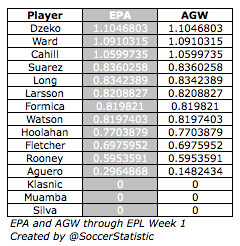Blog
Filtering by Tag: expected points added
Expected Points Added (EPA) Leaders Through Week 3
Ford Bohrmann
Below are the Expected Points Added (EPA) leaders for the EPL through week 3. The week 1 leaders can be found in an earlier post here. To reiterate, EPA weights goals based on how important they are to the team's chance of winning the game. This is based on the notion that a go ahead goal in the 90th minute is worth more than the 5th goal in a 5-0 win.

Some interesting things to point out...
- While Rooney has 5 goals this season, Welbeck's 2 goals have actually been more beneficial to United. In fact, Rooney doesn't even make the top 15 list above considering most of his goals were in the recent Arsenal blowout.
- Dzeko gets to the top of the list by scoring frequently and in important situations. His average goal weight is a solid .51 expected points added, but just because of the fact that he has scored 6 goals puts him at the top.
- It's still early in the season. Arteta makes third on the list with only 1 goal (a late game winning goal). Soon we'll start to see the top dominated by players who have scored a lot, and in important situations.
Expected Points Added (EPA) Data Through EPL Week 1
Ford Bohrmann
Before the season I promised to post Expected Points Added (EPA) totals after each week of the season. Here are the EPA totals from week 1. If you don't know what EPA is, check out a full explanation here.
To summarize it very basically, EPA is the total measure of how much each player's goals add to team's expected points total. That is why you see some EPA's of 0 below. These players scored goals that added nothing to the teams expected points total (for example, a team is up 3-0 and is already going to win, and a player scores a 4th in the 90th minute. This does not add to the team's chance of winning technically, because the team is already very likely to win.)
Average Goal Weight (AGW) is just EPA divided by the number of goals a player has scored. This measures how important, on average, a player's goals are. It can show us that a player consistently scores clutch goals (high AGW) or that they are scoring useless goals in blowouts (low AGW).

Dzeko has the highest EPA from his go ahead goal in the 57th minute. This equated to a little more than a point for City. Klasnic, Muamba, and Silva all scored goals that added no expected points for their team.
If you have any questions feel free to ask in the comment section. I'll be super busy this week between moving in to my apartment at school and 3-a-days for preseason but I'll try to keep some posts coming.
WPA and AGW Weekly Updates this Season
Ford Bohrmann
I just added the image on the right of the page ranking the players ranked by their WPA totals. The chart also includes the player's AGW and their goal totals for the season. I'll update this every week during the EPL season. An explanation of WPA and AGW are below.
WPA: Win Probability Added defines exactly what it sounds like it should: How much a player has added to their team's success through their goals. The way I calculate this is to sum how much each player's goals add to the team's probability of winning. Goals are a flawed statistic because every goal is obviously not worth the same amount. The 5th goal in the 90th minute in a 5-0 win is not important. The 1st goal in the 90th minute in a 1-0 win obviously is very important. To quantify these values I accumulated the total record (wins, losses, and ties) of every game in the past 10 years in the EPL. This way, I could calculate the exact winning percentage at every different game situation for both teams. For example, I know that scoring the 2nd goal to make a game 2-0 at home in the 67th minute increases a team's chance of winning by 10.845983%. WPA takes in to account the importance of each goal, and shows how much, overall, a player has added to their team's chance of winning a game through their goals.
AGW: Average Goal Weight is simply how much, on average, the player's goal is worth. Mathematically, it is the player's total WPA divided by the number of goals they have scored. For example, one player may only score 5 goals on the season, whereas another may score 15. However, the first player could have a higher AGW if they tended to score pivotal goals while the second player scored useless goals.
WPA and AGW are not perfect statistics, but they do provide a little more insight in to a player's goal scoring ability.